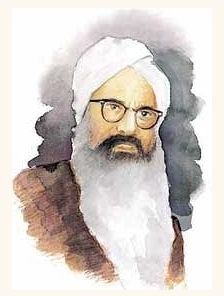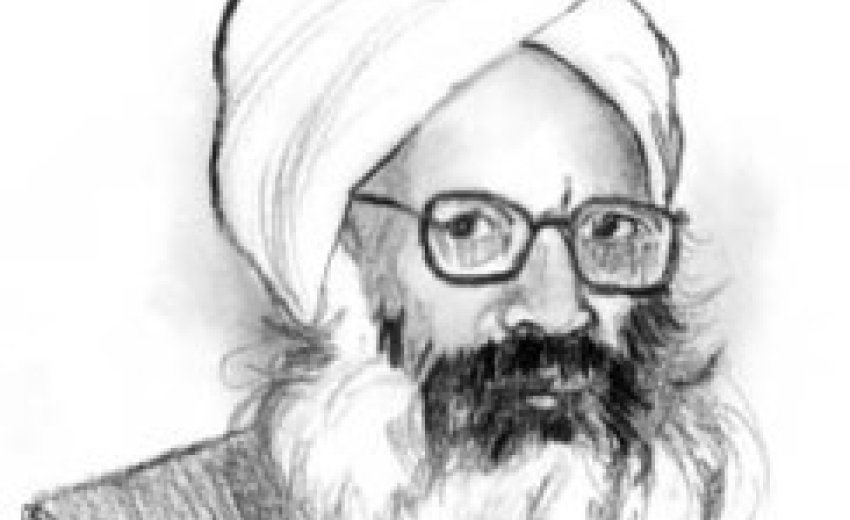A Chief Minister of Punjab for more than eight consecutive years, Partap Singh Kairon turned Punjab into an economic powerhouse. A no-nonsense administrator, he did not let procedures come in the way. The death anniversary of this builder of modern Punjab falls today (February 6.)
 Partap Singh KaironPartap Singh Kairon cut through the humbug of politics and morality of India after Independence. He was not one to accept that paraphernalia of sighs and aspirations which often masqueraded as policy in the newly independent nation. Not for him the support to a laughable prohibition or the lamentable support to khadi in a country that was one of the larger producers and exporters of textiles in the world. Kairon’s world was one in which industrialisation and science were the devices for moving forward.
Partap Singh KaironPartap Singh Kairon cut through the humbug of politics and morality of India after Independence. He was not one to accept that paraphernalia of sighs and aspirations which often masqueraded as policy in the newly independent nation. Not for him the support to a laughable prohibition or the lamentable support to khadi in a country that was one of the larger producers and exporters of textiles in the world. Kairon’s world was one in which industrialisation and science were the devices for moving forward.
Kairon was well known for not tolerating any nonsense and did not hesitate in calling a spade a shovel if that could get work done. Efficiency mattered, malfeasance was frowned upon. Procedures were meant to help decision-making rather than hamper them and if someone stood in the way, so much the worse for them. Bureaucrats, political colleagues and many others recalled being at the receiving end of Kairon’s ire.
On the eve of Independence Punjab had a surfeit of leaders. Each jockeying for positions of power, for pelf was yet not the main accompaniment of power. While Gopi Chand Bhargava and Bhim Sen Sachar led their own factions, Kairon carved a place for himself as a go-getter minister who could be relied to deliver on important tasks. As Sachar and Bhargava toppled each other’s ministries in quick succession they needed help from Kairon. Kairon in turn bargained for important portfolios like irrigation, development, forest, revenue, agriculture and veterinary. These in turn would enable Kairon to initiate the process of his dreams: to convert Punjab from being a mere supplier of military canon-fodder to the nation to an industrial and economic power-house.
Empowered the farmer
First as a minister and later as Chief Minister, Kairon did wonders for laying the foundation of modern agriculture in Punjab. He piloted various land reforms acts that empowered the actual cultivator. The processes that Kairon began of state-sponsored consolidation of land, construction of access roads and electrification would ultimately enable Punjab to emerge as the state that fed the nation single-handed. The per capita income of the state indicated the growth of Punjab under the Kairon style of development. From Rs. 321 in 1952-53 when the first elected government was formed in Punjab the per capita income increased to Rs. 331 in 1955-56, an increase of just over 3%. In the next five years, those were also the first five years of Kairon’s chief ministership, the per capita income increased more than 20% to Rs. 401 far outstripping the growth of income in India as a whole. Kairon hoped that if progress continued at the same pace it might be possible for Punjab to match the economic prosperity of Europe in about three years.
The recommendations of the States Reorganisation Commission in 1955 created considerable disturbances within the Congress ranks in Punjab. Chief Minister Sachar and Lala Jagat Narain were all for the full implementation of the SRC recommendations with regard to Punjab. However, Kairon was opposed to the idea of including Himachal Pradesh as part of Punjab. When Kairon let it be known in clear terms what he thought of those who supported the SRC on Punjab, Prabodh Chandra, then a Parliamentary Secretary, felt offended enough to submit his resignation in protest against the ‘open indignity’ inflicted on him by Kairon during the assembly debate on the SRC.
Tough with agitations
Kairon had great difficulty in reconciling himself with the Sachar government’s namby-pamby handling of various Akali agitations that were threatening to divide the state. Language, religion, caste and other hackneyed points of identity politics on which the Akalis wanted to reach out to the masses were anathema to a modernist Kairon. As the Akali agitation spread so did police action. In one instance, on July 4, 1955, when the agitators took shelter in a place of religious worship the police was forced to enter and arrest them. The Akalis took this to be a major sacrilege and forced the Chief Minister to publicly apologise for the police action.
With Congress Chief Minister Sachar showing signs of succumbing to the Akali demand to de facto divide the state into separate Hindi and Punjabi-speaking zones Kairon had little hesitation in leading a campaign to condemn the CM even though Sachar had the whole-hearted backing of Prime Minister Nehru himself for accepting some of the Akali demands in identity politics. The differences between the CM and his most important minister became so sharp that the CM asked for the resignation of the minister. Kairon refused. When Sachar complained to Nehru the Prime Minister responded in a letter to Sachar dated August 5, 1955, that the government of Punjab needed both Sachar and Kairon, and that from some points of view Kairon was more indispensable of the two. Finally, it was the CM who had to go. The Congress Legislative Party selected Kairon to be the new CM.
Kairon turned out to be the longest running CM that Punjab has seen since Independence. He remained at the helm of affairs for more than eight continuous years that no other CM has been able to match till now.
Thrust on education
As Chief Minister, Kairon came into his own. He had already overseen the construction of the Bhakra dam as the minister in charge of irrigation. Now, as CM he sought to increase the position of Punjab in the field of higher education for without higher education, according to Kairon, it was impossible for a people to get ahead in life. The budget for higher education was increased by almost 50 times to a grand Rs. 17 crore.
Important institutions of higher learning like Punjab Agriculture University and the Post-Graduate Institute of Medical Education and Research were set up. Plans were initiated to also establish a university in Patiala to improve the condition of the Punjabi language and another in Kurukshetra to promote studies in Indic culture and thought. In a small state like Punjab four universities were now available. Three full-fledged engineering colleges, polytechnics in each district and four medical colleges too were established at the behest of Kairon.
As a minister in the department of development Kairon launched a campaign to penalise those officers who were inefficient and/or dishonest. As newspapers reported it, he had a team of five trusted officers who would sift through the mass of petitions complaining against the government and then send out his own agents into the field to check out things.
Sometimes his agents also went in the garb of sadhus to find out the truth about the functioning of the government. By November 1953, he had penalised over 400 officers of which some 200 were from his own departments. “87 officers were discharged, 40 dismissed, seven convicted and ten reverted”, was how a newspaper put it. Senior ICS officers who were accused of corruption were immediately punished. When patwaris, the village-level revenue officials, went on strike, Kairon took steps to break the strike even while ensuring that the work of the people did not suffer. To the officers of the civil services he would sternly warn about zero tolerance towards communalism or any other kind of partisanship.
At the same time, he did not hesitate to stand by his officers and protect them from unfair allegations. The “Mahapunjab” agitation got out of hand in Hoshiarpur in 1956. The subsequent strong police action was condemned by many newspapers and the police was charged with having molested the agitating women. Some people even sat on a hunger strike to force the government to take action against the police. However, the Chief Minister insisted that notice also needed to be taken of the fact that the agitators had killed a police constable and that action against the police would be initiated only after a proper investigation. The subsequent inquiry absolved the police of any wrongdoing.
Dream for the region
On becoming Chief Minister Kairon began to rethink his position on the nature of the state of Punjab. While earlier he had opposed the inclusion of Himachal in Punjab now he suggested that not only Himachal, but also the large region that had been associated with the rivers of Punjab—including Jammu and Kashmir and parts of Rajasthan— should be part of a single regional entity. That would provide these states greater leverage in the federal structure of India as also enable them to leverage their respective strengths. Not much came out of this idea of Punjab because of its rejection by Jammu and Kashmir.
Kairon’s first term was marked by continuous battles against linguistic sectarianism. The champions of Hindi and Punjabi were busy battling it out on the streets and the government was hard put to ensure peace and quiet in the Punjab and Haryana region. A fallout of the uncompromising position taken up by the government was witnessed in the elections when Kairon was barely able to keep his seat in the Sarhali constituency by mere 31 votes. His Akali opponent, Mohan Singh Tur, was in prison at that time awaiting trial for activities in the Punjabi suba agitation. While Kairon won by a narrow margin, the Congress party won 128 seats, by far the largest number ever since Independence. The numerous contenders to the post of Chief Minister were silenced by Nehru’s support to Kairon, who formed his new ministry on March 11, 1962.
Enemies galore
By now however, Kairon had made far too many enemies. Even Feroze Gandhi, the most recent opponent of Nehru and his friends, had begun to take swings at Kairon. Feroze Gandhi charged Kairon with being in cahoots with smugglers and worse. “What explanation is there”, Gandhi would demand, “when a person with six previous convictions to his credit…had the daring to appear before a court of law and file an affidavit to the effect that the Chief Minister had directed the withdrawal of the case pending against him and that the order would reach the court from the Home Secretary?” [Times of India, January 8, 1960].
When it was not possible to corner the CM on such charges his opponents turned to attack his family. His wife and sons were implicated in various wrongdoings and were charged with using the influence of the CM’s office for personal gains. At the same time news began to filter in of various conspiracies to assassinate the Chief Minister. By October 1961, the Punjab police claimed to have unearthed at least three plots to kill Kairon. At his assassination in 1965, E N Mangat Rai, ICS, who had worked with Kairon for long years wrote in a [then unpublished] letter to newspapers, “I thought such reprisal may…come much earlier than it has”.
The writer is a Professor of contemporary Indian history and Chairman, Department of History, Panjab University, Chandigarh
